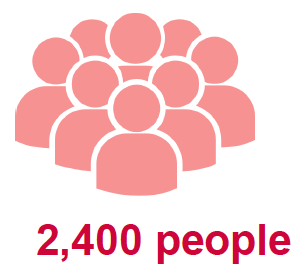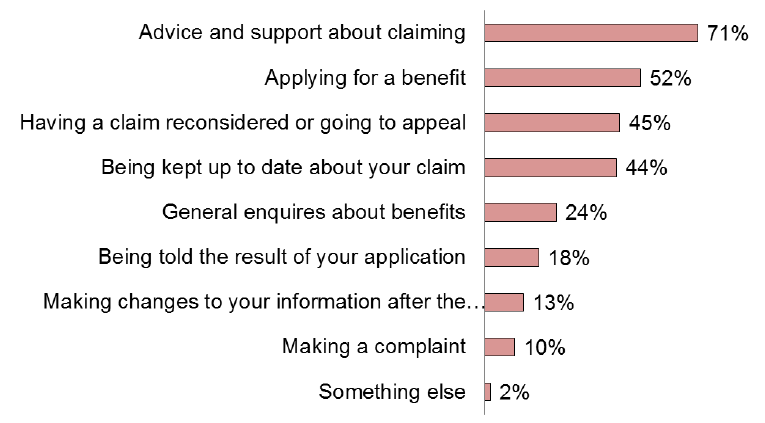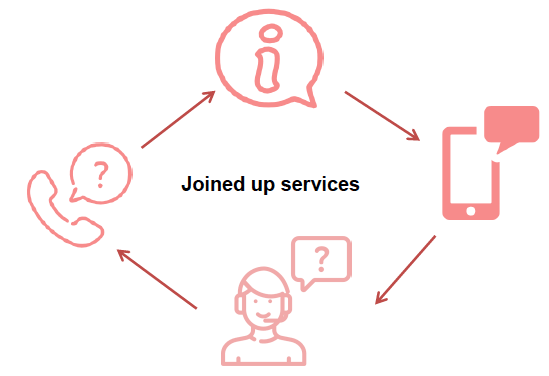Social security experience panels: about your benefits and you - visual summary
A visual summary of the focus group responses within ‘About Your Benefits and You’, which was developed with the Social Security Experience Panel.
This document is part of a collection
Social Security Experience Panels: About Your Benefits and You – Visual Summary of Focus Groups and Survey Research Findings
Background
The Scottish Government will become responsible for some of the benefits currently delivered by the Department for Work and Pensions ( DWP). As part of work to prepare for this change, Scottish Government have set up the Social Security Experience Panels.

The Scottish Government will work with people who have experience of the current benefit system to design a new social security system with the people of Scotland.

About the research
This report summarises the results of ‘About Your Benefits and You’ which was the first research activity undertaken with the Social Security Experience Panels after the recruitment stage called ‘Have Your Say’ finished.

35 focus groups were held in:
- Edinburgh
- Glasgow
- Dundee
- Aberdeen
- Inverness
- East Kilbride
- Ayr
- Airdrie
- Perth
- Hawick
- Dumfries
- Lerwick
About You and Your Benefits aimed to find out:
About you

About your experiences

About your priorities

For more information about how we did the research please see the full qualitative report at available at: www.gov.scot/socialsecurity-experience-panels
The quantitative research findings are available at: http://www.gov.scot/Resource/0052/00527173.pdf
Summary of findings
Priorities for improvement
Priorities for improvement in the new system
Respondents were asked about their top three priorities for the Scottish Government to improve in the new social security system. The majority of respondents (71 per cent) listed ‘advice and support about claiming’ as a priority. More than half listed ‘applying for a benefit’.

Percentage of respondents who rated each area as a priority for improvement

A number of respondents suggested that the whole system needed to be improved.
Some people said that it is important that services are joined up and consistent when providing information, advice and support.

Respondents spoke about the importance of listening to people and responding to their needs.
Reasons for prioritisation

Most respondents chose these priorities because of their previous experience of the system.
Some people said that barriers to accessing the benefits system had impacted on their finances or health.

Financial impact

Health impact
What Works Well
Friendly, Helpful and Knowledgable Staff

The biggest factor contributing to good experiences of the current system was when staff were polite, friendly and understanding.
People who had been to an assessment said it was good when staff knew about their condition.
"The assessor who came to assess my son for his
PIP
understood his condition and helped him through the assessment by
her attitude - she stood out amongst everyone else I have had to
deal with."
Survey Respondent
Benefits Providing Support and Independence
In general, respondents felt that benefits provide support to live independently and manage their condition.

"My
MP helped at the
Reconsideration stage and my Mobility assessment was increased thus
allowing me to retain the mobility car as without this I would have
been totally housebound."
Survey Respondent
Simple, Clear and Timely Processes
People said that simple, clear processes work well. For example short application forms.

"My adult son has a long-term lifelong condition. He has been on
benefits for many years and the application process was straight
forward. Recent forms are lengthy and demanding to fill in."
Survey Respondent

Similarly, respondents spoke of good experiences where things were done quickly.
"Assessment appointment came quickly. Payments started quite
quickly. Nurse who did assessment was experienced and understood my
condition."
Survey Respondent
Flexible Approaches

People said it works well when the system meets their needs. For example, when there is flexibility about where or when assessments are. This might include having an assessment at home.
Others spoke about it working well when there was choice in how they can contact the current benefits system.

Choice of how to contact system
Overall Negative Experiences

A large number of people were not able to give any examples of where things worked well in their experience.
"Nothing works well with the current system it is long winded
unsympathetic and almost an us against them type culture."
Survey Respondent
What Could be Improved
No flexibility in the Current System
Some people spoke about the current system not being able to meet their needs.
This included no choice in how application forms are completed or communication channels.
This is particularly difficult for those with mental health conditions or conditions that make certain types of communication impossible.
"As my
MS progresses, I find
writing and typing increasingly difficult. The thought of having to
fill out a
PIP form
yet again next year fills me with dread."
Survey respondent
There were some practical barriers in the system:

Needing to travel to assessment centres.

Short notice for assessment or tribunal dates. Not enough time to complete applications.

Not meeting care or support needs for disabled people.
Lack of clear information
Some people said they felt powerless when applying for benefits. This was because of:

Not enough clear information on what to expect

Long wait times without information
Some people spoke about finding out about the system from their friends or family rather than being given official information.

This sometimes made people feel worried or anxious.
Lack of Trust
A lot of people spoke about feeling that they don’t trust the DWP.
This included feeling distrust of both DWP and its staff.
People said that they felt they were ‘on trial’ and that they had to prove that they were a real claim.
Impact on Users
A lot of people spoke about the impact that applying for benefits had on them.
This included:

Worry about having enough money

Stress and anxiety

Fear of having to do it again
"I spend from the time I write any form to the time I get the
response on my knees mentally with fear, anxiety and stress."
Survey respondent
Use of These Findings
The findings outlined in this report, along with all findings from research with the Experience Panels, are being used to inform the design and delivery of social security in Scotland, to build a rights based social security system that works for the people of Scotland when they need it.
Further work with the Experience Panels
Research with the Experience Panels will continue throughout the coming years, allowing the Scottish Government to work with people with direct, personal experience of the current benefit system to design a new social security system that works for people. For further information please see /policies/social-security/engagement-on-social-security/
How to access background or source data
The data collected for this social research publication
☐ are available in more detail through Scottish Neighbourhood Statistics
☐ are available via an alternative route
☒ may be made available on request, subject to consideration of legal and ethical factors. Please contact socialresearch@gov.scot for further information.
☐ cannot be made available by Scottish Government for further analysis as Scottish Government is not the data controller.
Contact
Catherine Henry:
socialresearch@gov.scot
There is a problem
Thanks for your feedback